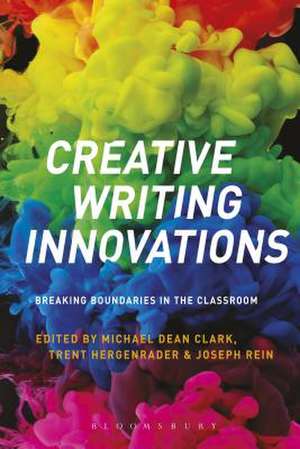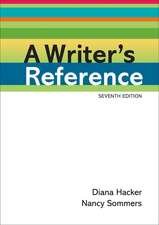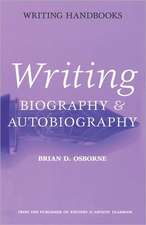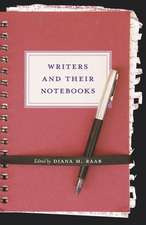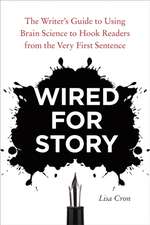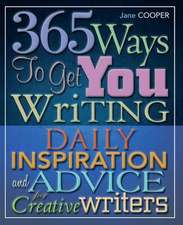Creative Writing Innovations: Breaking Boundaries in the Classroom
Editat de Dr Michael Dean Clark, Dr Trent Hergenrader, Assistant Professor of Creative Writing Joseph Reinen Limba Engleză Paperback – 22 aug 2018
| Toate formatele și edițiile | Preț | Express |
|---|---|---|
| Paperback (1) | 237.57 lei 6-8 săpt. | |
| Bloomsbury Publishing – 22 aug 2018 | 237.57 lei 6-8 săpt. | |
| Hardback (1) | 715.34 lei 6-8 săpt. | |
| Bloomsbury Publishing – 22 feb 2017 | 715.34 lei 6-8 săpt. |
Preț: 237.57 lei
Preț vechi: 305.66 lei
-22% Nou
Puncte Express: 356
Preț estimativ în valută:
45.47€ • 49.41$ • 38.22£
45.47€ • 49.41$ • 38.22£
Carte tipărită la comandă
Livrare economică 21 aprilie-05 mai
Preluare comenzi: 021 569.72.76
Specificații
ISBN-13: 9781350081635
ISBN-10: 1350081639
Pagini: 256
Ilustrații: 1 b/w illustration
Dimensiuni: 156 x 234 x 25 mm
Greutate: 0.35 kg
Ediția:NIPPOD
Editura: Bloomsbury Publishing
Colecția Bloomsbury Academic
Locul publicării:London, United Kingdom
ISBN-10: 1350081639
Pagini: 256
Ilustrații: 1 b/w illustration
Dimensiuni: 156 x 234 x 25 mm
Greutate: 0.35 kg
Ediția:NIPPOD
Editura: Bloomsbury Publishing
Colecția Bloomsbury Academic
Locul publicării:London, United Kingdom
Caracteristici
Covers multi-media writing, collaboration and identity in the creative writing classroom
Notă biografică
Michael Dean Clark is Associate Professor of Writing at Azusa Pacific University, USA. Formerly an award-winning journalist, his fiction and non-fiction work has appeared in Pleiades, Fast Forward, Relief, and a number of other periodicals.Trent Hergenrader is an Assistant Professor at the Rochester Institute of Technology, USA. He is a co-founder of the Creative Writing Studies Organization and the Journal of Creative Writing Studies and the author of Collaborative Worldbuilding for Writers and Gamers.Joseph Rein is Assistant Professor of Creative Writing at the University of Wisconsin, River Falls, USA. He is the editor of Dispatches from the Classroom and his fiction, poetry and essays have appeared in such publications as The Pinch Literary Magazine, Iron Horse Literary Review, and Ruminate Magazine. He is also an award-winning short-film screenwriter.
Cuprins
1. IntroductionPart 1: Rethinking the Workshop2. Invention and Early Process: A framework for the introductory multi-genre Creative Writing course (Timothy Mayers, Millersville University, USA)3. Against Undergraduate Creative Writing: Or, how to trick students into wanting what they need (Katharine Haake, California State University-Northridge, USA)4. Space Changing and Time Traveling: Empowering evolutionary creative writing (Graeme Harper, Oakland University, USA)5. Rocks are Hard; There Are Many Kinds of Rocks: A meta-workshop for undergraduate writers (Rachel Himmelheber, Warren Wilson College, USA)6. Emphasizing the Macro: An argument for the sequence graduate workshop (Derrick Harriell, University of Mississippi, USAPart 2: Expanding Genre7. The Poetry of Music, the Music of Poetry (Tom Hunley, Western Kentucky University, USA)8. Musico-Literary Miscegenations: Word and sound relationships in creative writing pedagogy (Hazel Smith, University of Western Sydney, Australia)9. Words with Borders, Projects Without: The collaborative possibilities of screenwriting (Joseph Rein, University of Wisconsin-River Falls, USA)10. Non-Sensical Sense: Impressions as connections in creative nonfiction (Michael Dean Clark, Azusa Pacific University, USA)Part 3: Creative Collaborations11. Collaborative Story Writing and the Question of Influence (Mary Ann Cain, Indiana University-Purdue University Fort Wayne, USA)12. Steampunk Rochester: A collaborative, location-based, interdisciplinary project (Trent Hergenrader, Rochester Institute of Technology, USA)13. Place-Based Pedagogy and Creative Writing as a Fieldwork Course (Janelle Adsit, Humboldt State University, USA)14. Our Town: Teaching Creative Writing students to love research and collaboration (Cathy Day, Ball State University, USA)Part 4: Identity and the Creative Writing Classroom15. Radical Inclusivity: Honesty and agony in an "imperfect" Creative Writing classroom (Tonya Hegamin, Medgar Evers College, USA)16. Genre-Queering the Creative Writing Classroom (Ching-In Chen, University of Wisconsin-Milwaukee, USA)17. Pedagogy and Authority in Teaching The Wasteland: Authorial voices and postcolonial criticism (Prageeta Sharma, University of Montana in Missoula, USA)Index
Recenzii
Written by practitioners for practitioners whose hackles might still raise at the suggestion that theirs is a soft option, there is a sense of community in these pages which speak to those already working in the field and so do not waste time explaining, but move swiftly to examine the subject's dynamics and potential. It aims to challenge practitioners in order to provoke newer forms and studies in this field . Does the book achieve what it sets out to do? Certainly. It points towards the 'vast possibilities of our field' and it offers discussion, debate and practical resources and it provokes newer enquiries . Our students need to be in safe hands for the exciting journeys they embark on, and this book is a strong map for those of us who direct and point out the possible routes.
Clark (Azusa Pacific Univ.), Hergenrader (Rochester Institute of Technology), and Rein (Univ. of Wisconsin, River Falls) have produced a compelling follow-up to their edited collection Creative Writing in the Digital Age (2015). This new offering assembles 16 essays with the shared goal of rethinking and restructuring university-level creative writing curricula. The essays are organized in four sections-'Rethinking the Workshop,' 'Expanding Genre,' 'Creative Collaborations,' and 'Identity and the Creative Writing Classroom'-and many of the contributors express dissatisfaction with the hallmark of creative writing instruction in the US: the creative writing workshop. For example, in his manifesto 'The Unworkshop,' Graeme Harper radically revises the workshop method by prioritizing intellectual curiosity and student autonomy above expectations for traditional academic coursework. By contrast, Derek Harriell proposes a sequenced graduate writing workshop that improves rather than dismantles the traditional workshop. Another remarkable essay, Ching-In Chen's 'Gender Identity and the Creative Writing Classroom,' articulates an approach to creative writing pedagogy that values and affirms the work of genderqueer and nonbinary writers. Taken together, the essays in this collection expand the emergent field of creative writing studies and provide thoughtful, replicable strategies for guiding and supporting student writers. Summing Up: Highly recommended.
Essential reading for undergraduate and graduate-level creative writers who teach ... [It] advance[s] the rigor of creative writing as an academic discipline with deep ties to the sister world of composition and rhetoric while nudging teacher-writers toward innovative, process-oriented pedagogies and heuristics.
Clark (Azusa Pacific Univ.), Hergenrader (Rochester Institute of Technology), and Rein (Univ. of Wisconsin, River Falls) have produced a compelling follow-up to their edited collection Creative Writing in the Digital Age (2015). This new offering assembles 16 essays with the shared goal of rethinking and restructuring university-level creative writing curricula. The essays are organized in four sections-'Rethinking the Workshop,' 'Expanding Genre,' 'Creative Collaborations,' and 'Identity and the Creative Writing Classroom'-and many of the contributors express dissatisfaction with the hallmark of creative writing instruction in the US: the creative writing workshop. For example, in his manifesto 'The Unworkshop,' Graeme Harper radically revises the workshop method by prioritizing intellectual curiosity and student autonomy above expectations for traditional academic coursework. By contrast, Derek Harriell proposes a sequenced graduate writing workshop that improves rather than dismantles the traditional workshop. Another remarkable essay, Ching-In Chen's 'Gender Identity and the Creative Writing Classroom,' articulates an approach to creative writing pedagogy that values and affirms the work of genderqueer and nonbinary writers. Taken together, the essays in this collection expand the emergent field of creative writing studies and provide thoughtful, replicable strategies for guiding and supporting student writers. Summing Up: Highly recommended.
Essential reading for undergraduate and graduate-level creative writers who teach ... [It] advance[s] the rigor of creative writing as an academic discipline with deep ties to the sister world of composition and rhetoric while nudging teacher-writers toward innovative, process-oriented pedagogies and heuristics.
